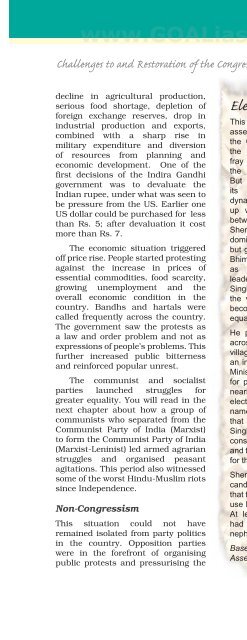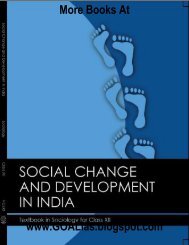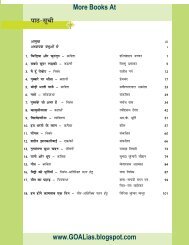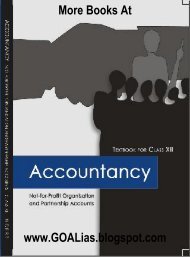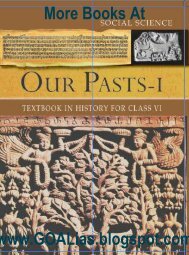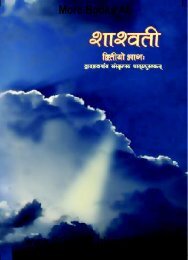t.com www.GOALias.blogspot.com www.GOALias.blogspot.com
t.com www.GOALias.blogspot.com www.GOALias.blogspot.com
t.com www.GOALias.blogspot.com www.GOALias.blogspot.com
- No tags were found...
You also want an ePaper? Increase the reach of your titles
YUMPU automatically turns print PDFs into web optimized ePapers that Google loves.
<strong>www</strong>.<strong>GOALias</strong>.<strong>blogspot</strong>.<strong>com</strong>Challenges to and Restoration of the Congress System 87decline in agricultural production,serious food shortage, depletion offoreign exchange reserves, drop inindustrial production and exports,<strong>com</strong>bined with a sharp rise inmilitary expenditure and diversionof resources from planning andeconomic development. One of thefirst decisions of the Indira Gandhigovernment was to devaluate theIndian rupee, under what was seen tobe pressure from the US. Earlier oneUS dollar could be purchased for lessthan Rs. 5; after devaluation it costmore than Rs. 7.The economic situation triggeredoff price rise. People started protestingagainst the increase in prices ofessential <strong>com</strong>modities, food scarcity,growing unemployment and theoverall economic condition in thecountry. Bandhs and hartals werecalled frequently across the country.The government saw the protests asa law and order problem and not asexpressions of people’s problems. Thisfurther increased public bitternessand reinforced popular unrest.The <strong>com</strong>munist and socialistparties launched struggles forgreater equality. You will read in thenext chapter about how a group of<strong>com</strong>munists who separated from theCommunist Party of India (Marxist)to form the Communist Party of India(Marxist-Leninist) led armed agrarianstruggles and organised peasantagitations. This period also witnessedsome of the worst Hindu-Muslim riotssince Independence.Non-CongressismThis situation could not haveremained isolated from party politicsin the country. Opposition partieswere in the forefront of organisingpublic protests and pressurising theElection in a Rajasthan VillageThis is a story about 1967assembly elections. Inthe Chomu constituency,the main parties in thefray were Congress andthe Swatantra party.But village Devisar hadits own local politicaldynamics and it got mixedup with the <strong>com</strong>petitionbetween the two parties.Sher Singh, traditionallydominated village politics,but gradually his nephew,Bhim Singh was emergingas the more popularleader and rival. Though both were Rajputs, BhimSingh cultivated the support of many non-Rajputs inthe village by attending to their requirements afterbe<strong>com</strong>ing the panchayat Pradhan. So, he struck a newequation—the alliance of Rajputs and non-Rajputs.He proved to be more adept in building alliancesacross the village by supporting candidates in othervillages for the posts of village Pradhan. In fact, he tookan initiative and took a delegation to the State ChiefMinister and Congress leader Mohan Lal Sukhadiafor pressing the name of one of his friends from anearby village as Congress candidate in the Assemblyelection. When Sukhadia convinced him of some othername, Bhim Singh, in turn, convinced many othersthat they should work for the party candidate. BhimSingh knew that if the party candidate won from thisconstituency, that candidate would be<strong>com</strong>e a ministerand thus, he would have direct contacts with a ministerfor the first time!Sher Singh had no option but to work for the Swatantracandidate, who was a jagirdar. He kept telling peoplethat the jagirdar would help build the village school anduse his resources for the development of the locality.At least in Devisar village, the Assembly electionhad turned into a factional fight between uncle andnephew.Based on Anand Chakravarti, ‘A Village in ChomuAssembly Constituency in Rajasthan.’


